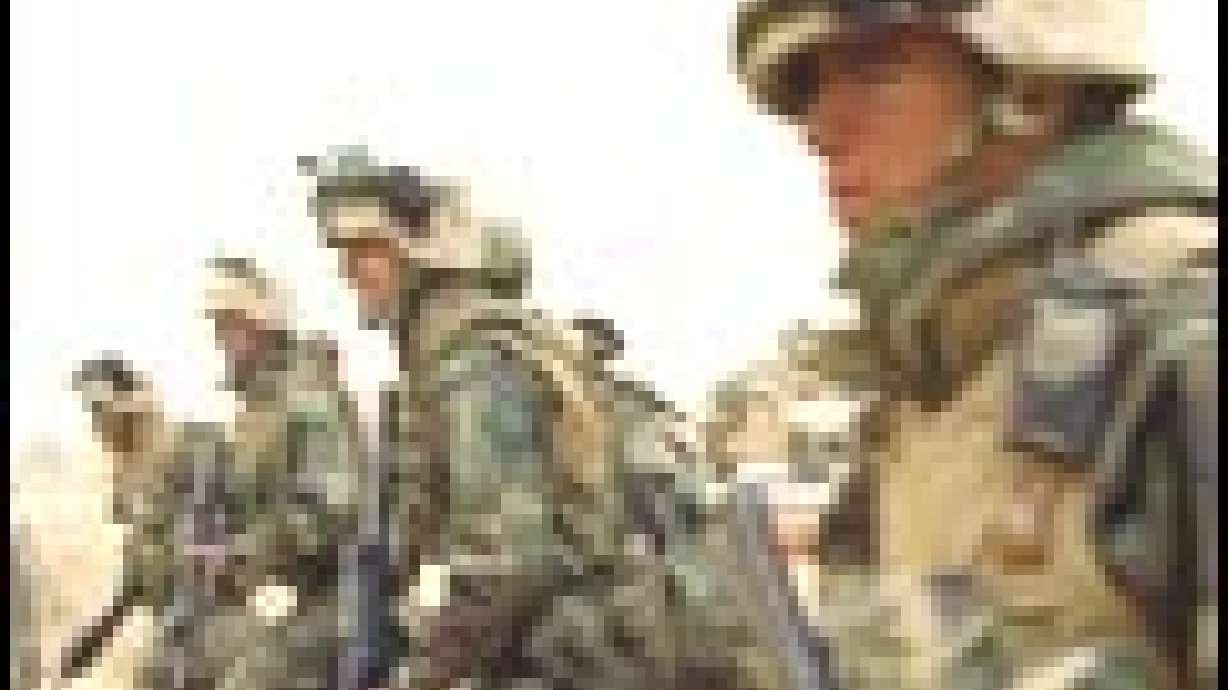Estimated read time: 5-6 minutes
This archived news story is available only for your personal, non-commercial use. Information in the story may be outdated or superseded by additional information. Reading or replaying the story in its archived form does not constitute a republication of the story.
SOUTH-CENTRAL IRAQ (AP) -- Thousands of Marines pushed north toward Baghdad in "seek-and-destroy" missions Sunday, trying to open the route to the Iraqi capital and stop days of attacks along the stretch that has become known as "Ambush Alley."
Charging into previously unsecured areas, the Marines tried to provoke attacks in order to find Iraqi fighters and defeat them. A chaplain traveling with them handed out humanitarian packages to distrustful Iraqi civilians encountered along the way.
The U.S.-led forces reported other successes Sunday. In Najaf -- where an Iraqi suicide attack Saturday killed four U.S. troops -- the 101st Airborne division surrounded the city Sunday and secured an airfield after fierce fighting.
Iraqi forces had fired mortars at Apache helicopters, forcing the aircraft to pull back and call in artillery backup, according to field reports.
The division was now poised to enter the holy Shiite city and begin rooting out paramilitary forces that have waged stiff resistance for days, said Command Sgt. Maj. Marvin Hill of the 101st Airborne Division.
In Nasirayah, scene of fierce fighting over the past week, a Marine raid secured buildings held by the Iraqi 11th Infantry Division that contained large caches of chemical decontamination equipment, weapons and ammunition.
The U.S. Central Command reported that in one building, they found more than 300 chemical suits and gas masks, atropine injectors, two chemical decontamination vehicles and other decontamination devices.
In another, they found more than 800 rocket-propelled grenades, along with mines, hundreds of mortar and artillery rounds and thousands of rifle rounds -- so much, said Col. Ron Johnson, Task Force Tarawa Operations Officer, that "it would be too dangerous to the city to blow it in place. We are going to have to transport it somewhere safe."
On the Marine route north, Army supply trucks appeared for the first time Sunday, confirming field reports that Army and Marine forces were meeting for the first time in the ground invasion. Marines have been trekking north along Route 80 -- known as the "Highway of Death" -- and Army forces have punched their way across desert terrain.
Rank-and-file Marines, ordered to intercept and question each civilian they see along the route after an Iraqi army officer attacked a group of Americans in a suicide bomb attack Saturday, also handed out ration packets. For hungry Iraqis, this gift was the only thing that could convince them the Marines were not there to hurt them.
One Marine said an Iraqi prisoner of war had told him "they'd heard to be a Marine you had to eat a baby, or kill someone."
Frightened Iraqis scrambled into their homes at the sight of the Americans, Marines said. One old woman clutched her mule with one hand and smacked her dogs forward with the other, trying to get them to attack the approaching American soldiers. Like many other exchanges, that encounter ended with smiles and gratitude for the rations.
Elsewhere, the U.S. Central Command, which oversees the war in Iraq, said coalition warplanes hit a series of targets in the Iraqi capital overnight into Sunday morning. In a "key strike," coalition aircraft bombed the eastern Baghdad barracks of the main training facility of the Iraqi paramilitary forces. With advancing ground forces expecting a showdown with Saddam Hussein's Republican Guard in the final 50-mile march to Baghdad, the coalition sought to hobble Iraqi forces by striking a fuel depot in the holy Shiite city of Karbala.
"While the army is not moving forward, it is the turn of the air to shape the battle space," said Wing Commander Andy Suddards, the British pilot who led the attack. "If the tanks have no fuel, it is all going to help."
Coalition warplanes also struck surface-to-air missile batteries in eastern Baghdad, as well as the Abu Garayb presidential palace, just east of Baghdad's international airport, and two facilities at the Karada intelligence complex, on the banks of the Tigris River, Central Command said.
To the south, British commandos exchanged fire with Iraqi paramilitaries in an eastern suburb of Basra, Iraq's second-largest city, British military spokesman Group Capt. Al Lockwood said. The operation apparently aims to block off any escape route for Iraqi forces trying to leave Basra.
"They are putting up some resistance, but they are disorganized," Lockwood said of the paramilitary forces.
At least 4,000 Iraqi prisoners of war have been taken by the coalition since the conflict began, Lockwood said. On Saturday, a British tribunal released 35 civilians who had been swept up among them, he said.
British forces surrounding Basra have skirmished with paramilitaries loyal to Saddam for several days, mostly on the city's western outskirts. The Arab satellite television channel al-Jazeera, which has a correspondent in Basra, also reported a 90-minute exchange of tank and artillery fire Sunday near a bridge on the city's western edge.
Basra, Iraq's main seaport, is the heart of the country's southern oil facilities. A mostly Shiite Muslim city of about 1.3 million people, many in Basra may oppose Saddam's Sunni Muslim regime, but the city remains in the grip of his ruling Baath party militia.
One Baath official warned on Arab television that fighters were competing to die in suicide attacks like the one that killed four American soldiers Saturday.
"The holy warriors are rushing to die or be martyred," said Abdul-Baqi Saadoun, the No. 2 Baath official in southern Iraq, in an interview broadcast Sunday on al-Jazeera.
(Copyright 2003 by The Associated Press. All Rights Reserved.)








